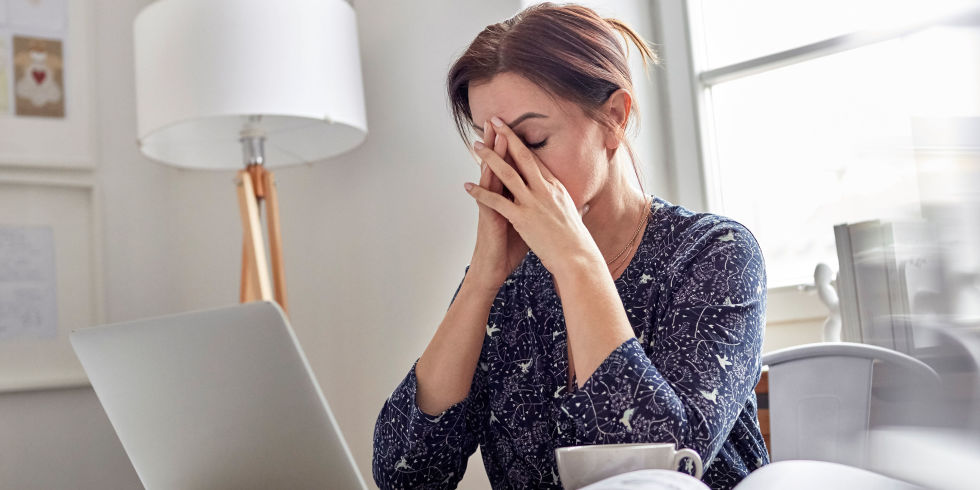Everyone who’s ever felt the familiar rush of anxiety from a single email knows that stress can stem from the simplest of places. Everything from politics to relationship conflicts to work dissatisfaction can trigger a bad mood, but it’s when one bad day becomes a series of them that stress becomes a larger issue.
‘Stress can be a healthy part of our life. If we didn’t have some sort of stress we wouldn’t be driven to complete the tasks that we do,’ says Dr. Lindsay Henderson, PsyD, a psychologist who treats patients virtually via the app LiveHealth Online.
Below, she provides some common symptoms for the over-stressed, over-worked person to look out for and how to manage them.
When you’re stressed out it’s even more difficult to focus, says Henderson, which can be a significant drain on productivity at work. LiveHealth Online did a survey of 1,500 adults about stress and found that 50 per cent of cite work as their main cause of stress, so it can be a domino effect of work stress and under-performance if you aren’t seeking outlets for your stress and giving yourself enough headspace to decompress.
Forty percent of the correspondents in the same LiveHealth Online survey said that they had missed a work or social or family event because of stress. ‘Those are the things that are required of us and that are important to us,’ says Henderson, which can take a toll on our self-esteem and our sense of a work-life balance.
Two-thirds of the correspondents also said they noticed the impact of stress on their physical health. The primary symptom that people listed was an increasing difficulty sleeping due to stress and the ways their lives are so inextricably linked to technology and screen time.
Changes in eating patterns is another big symptom of stress. Henderson says women will list eating – mostly overeating but also under-eating – as one of the factors in their stress, more so than men. ‘Men will have more difficulty with anger and irritability and one of the health implications of that is blood pressure problems. So women may turn more inward than men do, while men tend to externalise that,’ she says.
Irritability and lack of patience with friends, family, and roommates are also the calling cards of stress and anxiety, which can cause you to lash out more or distance yourselves from others, says Henderson.
The most immediate physical manifestation of stress is a difference in the way you carry yourself. Henderson says to look out for tension in your body, clenching or tightness of your jaw, and an upset stomach (which can also contribute to anxious people not eating enough).
As a therapist, Henderson works one-on-one with people to figure out what the root causes of their stress are and ways to change their behavior. The perks of working for a tele-therapy app is that she has more flexibility with her patients, who can make an appointment for a lunch break-sized virtual session wherever they are (in the car, at work, or at home).
But for some, it’s not so easy to create lasting stress-free routines. ‘If you have problems with a high-stress job, little kids, or money, it’s hard to stop those, so it’s also important to learn healthy coping mechanisms,’ she says, and recommends several ways to decompress and unplug.
Exercise
Obviously exercise is always important, but Henderson notes that your workout doesn’t have to be your standard yoga class. Even parking further away from the supermarket to get some walking in, taking a few seconds to do some deep breathing and stretching, or going for a jog around the block, she says, can serve as a time-out for your mind and a chance to reset.
Set a routine
When you’re getting overwhelmed or stressed, Henderson says that one thing that easily gets lost in the shuffle is a sense of structure. She likes to evaluate patients for whether they’re eating enough and sleeping enough, etc., and recommends that people establish semi-regular lifestyle patterns so that it doesn’t enter any more chaos into their schedule.
Stay connected socially
Yes, there are definitely moments when you’re stressed out from work and the last thing you want to do is make awkward small talk with another human being at happy hour. As Henderson says, ‘We have a tendency to pull away and isolate when feeling overwhelmed, but social connection is healthy and important.’
Well, with one caveat. She says that healthy social activity is usually not just an online correspondence (um, does Words With Friends count?) or an interaction with someone who you don’t have a healthy relationship to begin with.
Find ways to distract yourself
So how can you turn your brain off? It could mean watching television or reading a mindless gossip magazine or something to get your mind concentrated on something else, she says.
Meditate and focus on altering your thoughts
OR, last but arguably the most important, is training your brain to focus on the now and slowing down so that you’re more aware of your thoughts. Starting to meditate and paying more attention to your thoughts, she says, will make it easier to notice the unhealthy ones. It could be as simple as following a guided meditation on the train. ‘Noticing and recognising thought patterns are your first steps toward changing them.’












